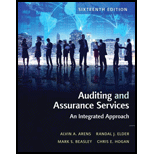
Auditing and Assurance Services (16th Edition)
16th Edition
ISBN: 9780134065823
Author: Alvin A. Arens, Randal J. Elder, Mark S. Beasley, Chris E. Hogan
Publisher: PEARSON
expand_more
expand_more
format_list_bulleted
Question
Chapter 2, Problem 13.2MCQ
To determine
Determine the requirement of responsibilities principle that underlies AICPA auditing standards from the given options.
Expert Solution & Answer
Want to see the full answer?
Check out a sample textbook solution
Students have asked these similar questions
Need Answer
Sameer has $9,800 of net long-term capital gain and $5,200 of net short-term capital loss. This nets out to a: (a) $4,700 net long-term loss (b) $4,600 net long-term gain (c) $4,700 net short-term gain (d) $4,700 short-term loss help
What is the adjusted cost of goods sold for the year?
Chapter 2 Solutions
Auditing and Assurance Services (16th Edition)
Ch. 2 - Prob. 1RQCh. 2 - Prob. 2RQCh. 2 - Prob. 3RQCh. 2 - Prob. 4RQCh. 2 - Prob. 5RQCh. 2 - Prob. 6RQCh. 2 - Prob. 7RQCh. 2 - Prob. 8RQCh. 2 - Prob. 9RQCh. 2 - Prob. 10RQ
Ch. 2 - Prob. 11RQCh. 2 - State what is meant by the term peer review. What...Ch. 2 - Prob. 13.1MCQCh. 2 - Prob. 13.2MCQCh. 2 - Prob. 13.3MCQCh. 2 - Prob. 14.1MCQCh. 2 - Prob. 14.2MCQCh. 2 - Prob. 14.3MCQCh. 2 - Prob. 15.1MCQCh. 2 - Prob. 15.2MCQCh. 2 - Prob. 15.3MCQCh. 2 - Prob. 16DQPCh. 2 - Prob. 17DQPCh. 2 - Prob. 18DQPCh. 2 - Prob. 19DQPCh. 2 - Prob. 21DQP
Knowledge Booster
Similar questions
- Can you help me solve this general accounting problem using the correct accounting process?arrow_forwardDuring the fiscal year ended 2020, a company had revenues of $500,000, cost of goods sold of $350,000, and an income tax rate of 25% on income before income taxes.arrow_forwardHii teacher please provide for General accounting question answer do fastarrow_forward
arrow_back_ios
SEE MORE QUESTIONS
arrow_forward_ios
Recommended textbooks for you
 Auditing: A Risk Based-Approach (MindTap Course L...AccountingISBN:9781337619455Author:Karla M Johnstone, Audrey A. Gramling, Larry E. RittenbergPublisher:Cengage Learning
Auditing: A Risk Based-Approach (MindTap Course L...AccountingISBN:9781337619455Author:Karla M Johnstone, Audrey A. Gramling, Larry E. RittenbergPublisher:Cengage Learning Auditing: A Risk Based-Approach to Conducting a Q...AccountingISBN:9781305080577Author:Karla M Johnstone, Audrey A. Gramling, Larry E. RittenbergPublisher:South-Western College Pub
Auditing: A Risk Based-Approach to Conducting a Q...AccountingISBN:9781305080577Author:Karla M Johnstone, Audrey A. Gramling, Larry E. RittenbergPublisher:South-Western College Pub

Auditing: A Risk Based-Approach (MindTap Course L...
Accounting
ISBN:9781337619455
Author:Karla M Johnstone, Audrey A. Gramling, Larry E. Rittenberg
Publisher:Cengage Learning

Auditing: A Risk Based-Approach to Conducting a Q...
Accounting
ISBN:9781305080577
Author:Karla M Johnstone, Audrey A. Gramling, Larry E. Rittenberg
Publisher:South-Western College Pub
